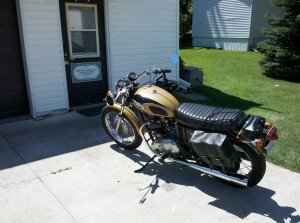Today in The Community, we look back on a post made on June 25, 2012. How do you find community in the summertime? What might that teach us about how we do church?
I remember when, in my late teens, I phoned my mom to tell her I would be home for the weekend. “Are you taking the train,” she asked? “No.” “Have you found a ride?” “Well, sort of.”
I had just purchased a moped: an old, mustard brown, 50cc Jawa from Czechoslovakia. The drive took me a little over 3 hours, and the gas cost me $1.14. Looking back, I’m almost certain that my parents spent the morning worried that they would never see me again. Either I wouldn’t make it home it one piece, or I would be swept up by an outlaw biker gang, destined to spend the rest of my life wearing leather pants and participating in organized crime. I’ll admit that I was pulled over on that first trip–not because I had done anything wrong, but because the police officer had never seen a moped before.
Carry on my wayward son,
There’ll be peace when you are done
Lay your weary head to rest
Don’t you cry no more
I’ve long been fascinated with motorcycles: symbols of both freedom and stewardship, they represent to me much of what the church professes. Coasting through the countryside with the wind (and bugs) in your face and the sun on your shoulder is a completely different experience with creation than moving, alone, from point A to point B in a large box designed to carry five passengers. It’s a little ironic, I think, that bikers are commonly associated with the behaviours of a handful of disrespectful riders. But you know, before I bought the beautiful gold bike pictured above, I wasn’t able to see beyond the stereotypes. Leather gloves jackets were, to me, about fashion, not safety. Audible engines and bright daytime lights were about ego, not visibility and driver awareness. Motorcyclists driving in the tire track near the yellow line were road hogs, not responsible drivers doing what their own safety and the law required of them. It’s easy to cast judgement when we live in a world of us and them, isn’t it?
Once I rose above the noise and confusion
Just to get a glimpse beyond the illusion
I was soaring ever higher, but I flew too high
Though my eyes could see I still was a blind man
Though my mind could think I still was a mad man
I hear the voices when I’m dreamin’, I can hear them say
Granted, the experience of owning a motorcycle has changed me a little. Transportation, at least close to home or on weekends, has become a joyful experience rather than a chore. I’m able to clear my mind and relax after a ride. I might even call it a spiritual experience. I’ve become more comfortable wearing jeans and having grease on my hands. I’ve stepped away from the comforts of jazz and classical music, and spent more time listening to classic rock, like the Kansas piece that narrates this reflection. And I think I understand it better, because the parable upon which it is based is about us, not them. But more than anything else, I’ve been transformed by the simple truth that I have no idea what I’m doing.
Masquerading as a man with a reason
My charade is the event of the season
And if I claim to be a wise man, it surely means that I don’t know
On a stormy sea of moving emotion
Tossed about I’m like a ship on the ocean
I set a course for winds of fortune, but I hear the voices say
You see, driving a British vehicle more than 40 years old has its challenges: spark plugs get fouled up. Bolts fall off while I’m driving. Fuses blow. I leave puddles of oil in parking lots. But it has its advantages: I’m driving a piece of history. I have yet to drive anywhere (and I do mean anywhere) without being stopped in the parking lot for a chat. Old men tell me about their first motorcycles. Young women tell me about their grandfathers. Mechanics examine my engine and give me pointers. And despite the fact that I’m still learning how to maintain the thing, I know that I’m not alone.
Carry on, you will always remember
Carry on, nothing equals the splendor
Now your life’s no longer empty
Surely heaven waits for you
That, perhaps, has been the most wonderful element of the motorcycle experience, and it’s forced me to rethink how I define community, especially in the church. Riding on two wheels grants instant membership into a community of common understanding. Bikers wave at one another when passing on the street, no matter their age, gender, or experience. And a stop anywhere with other motorcycles in the parking lot suggests that I am among friends.
Carry on my wayward son,
There’ll be peace when you are done
Lay your weary head to rest
Don’t you cry no more
Where have you found community? Do you share my experience, or have you found help and comfort in another community or interest group? How can we, as Christians, learn from these unique communities? Let’s talk about it!
Addendum:
It seems only fair to share the song framing this reflection. But rather than the original, I want to share my favourite version, as recorded by the early 90’s all-female Christian band, Rachel Rachel. Kansas fans should recognize the guest soloist. 🙂

